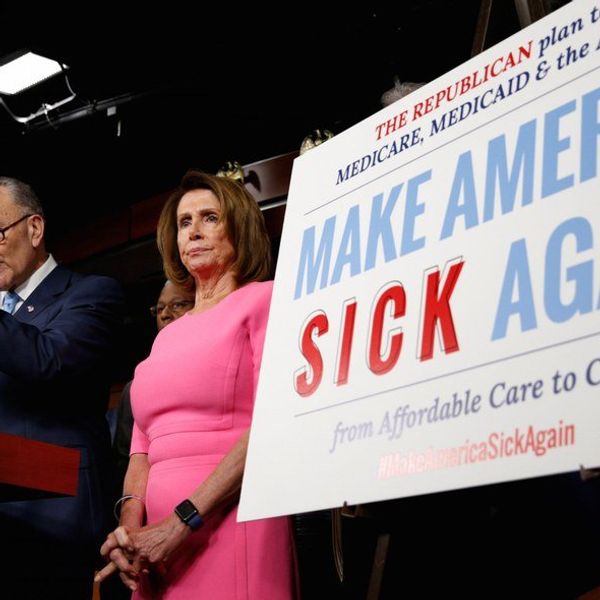Well, the Affordable Care Act is seeing its final days as policy. After countless instances of Republican Congressmen like Marco Rubio bragging about how they'd voted to repeal Obamacare multiple times, Senator Ted Cruz vowing to "repeal and replace every word of Obamacare" when he was a presidential candidate, and President-elect Donald Trump calling it a disaster, the repealing of Obamacare started to develop the feel of a pipe dream that Republicans would rally back and forth about but didn't actually think possible, due to the Obama veto, the thinning popularity of the Republican Party, and the weakening image of its ability to elect a candidate to the presidency. So, when Donald Trump was shockingly elected in the wee hours of November 9, and when the Republican majorities in the House and Senate were successfully defended, anti-Obamacare Republicans like Ted Cruz and Marco Rubio had the bittersweet realization that they would finally repeal Obamacare, but, now, they have to do that other thing: replace it, which, apparently, no one has prepared for.
While Trump and the Republicans may be eager to throw Obamacare out the window as soon as possible, they need to be warned: they absolutely should not take any drastic action until they have something to fill the resulting hole. Donald Trump has acknowledged the enormity of removing the current American healthcare policy by admitting that he plans on keeping parts of the Affordable Care Act in place after he takes office. He sees that there are terrible consequences to simply ripping up the ACA.
So, what are these consequences?
ObamaCare can be seen analogically as an addictive drug. Since the Affordable Care Act's birth in 2010, over thirty million Americans have signed up for Obamacare and, for the first time, have access to healthcare. Like an addict, they got hooked and had it made for them, at the expense of their employers and the millions whose premiums and deductibles saw ugly increases. The pros of Obamacare often outweigh the cons, but the American people have voted to get rid of it. So now, thirty million people will have a drug they have been reliant on stripped away from them. Going cold turkey when you're addicted to, say, heroin, is often deadly. Well, this concept is paralleled in the repealing of Obamacare when there is no plan to replace it. Senate Minority Leader Chuck Schumer said it best on Wednesday, January 4: this will "Make America Sick Again."
So, while the middle and upper classes can look forward to seeing their healthcare costs finally (or, hopefully) deflate, it is vital that a replacement is enacted as soon as possible.
Even Trump, one of the most outspoken enemies of Obamacare, is doing his to assure the public that, possibly through the parts of the ACA that he plans on keeping, Americans with pre-existing health conditions that are using Obamacare will not lose coverage once the law is repealed. How much of that promise that will eventually turn out to be truth rather than optimistic prediction is anyone's guess. But, there actually is a bit of meat to this plan.
Speaker Paul Ryan is one of the few popular Republicans who has actually been working on a better way to handle healthcare than Obama's way. In fact, that's the name of the paper he wrote containing these pieces to a less socialized healthcare system- a "Better Way." It calls, of course, for the repealing of the ACA, but with the catch that those who are sick but already covered will not only be protected from a loss of coverage, but will also not be charged more before, during, and after the transition from Obamacare to the next healthcare reform, which doesn't currently have a name but is speculated to be called something along the lines of "Trumpcare," because, why not. Vice President-elect Mike Pence has also promised this to the public, saying that this will be the case in the new healthcare reform "so long as they have paid their premiums consistently." Unfortunately, this all depends on one thing: whether wealthy people will sign up for this new health plan, because, that is where all the money that makes this possible will come from. So, the GOP's biggest challenge in this endeavor is to get wealthy people to sign up.
But, this is all good. This shows that there are ways to protect current Obamacare recipients while repealing Obamacare. It also shows that GOP lawmakers aren't the heartless monsters that the more left-wing media says they are, as they are pursing these protections.
The grand question is this: what can we expect? Are we going to see a full-scale transition from a semi-socialist healthcare system to a capitalist-to-the-core system? Or, will we see something Republican, but also sympathetic to current Obamacare users? The ideas currently being tossed around Capitol Hill form an entire spectrum within this range which makes it tough to predict this early in the game. But, whatever happens, the priority right now is to form a plan and a transition that will minimize, if not eliminate, any damage that current Obamacare users can receive. Because, while perfecting healthcare reform is an important duty for a government to implement, it is entirely unethical for a government to pursue this by taking healthcare away from thirty million of its citizens.





















